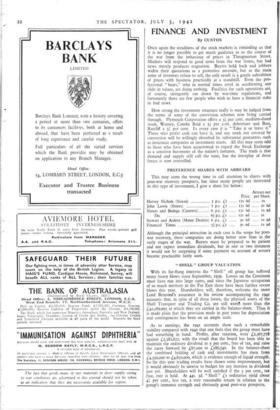FINANCE AND INVESTMENT
By CUSTOS
ONCE again the steadiness of the stock markets is reminding us that it is no longer possible to get much guidance as to the course of the war from the behaviour of prices in Throgmorton Street. Markets will respond to good news from the war fronts, but bad news merely produces stagnation. Buyers hold back and jobbers widen their quotations as a protective measure, but as the main army of investors refuse to sell, the only result is a gentle subsidence of prices with business practically at a standstill. Even the pro- fessional "bears," who in normal times revel in accelerating any slide in values, are doing nothing. Facilities for such operations are, of course, stringently cut down by war-time regulations, and fortunately there are few people who wish to have a financial stake in bad news.
How strong the investment structure really is may be judged from the terms of some of the conversion schemes now being carried through. Plymouth Corporation offers a 31 per cent, medium-dated stock, Watney, Combe Reid a 31 per .cmt. debenture and Bass, Ratcliff a 3+ per cent. In every case it is "Take it or leave it." Those who prefer cash can have it, and any stock not covered by conversion will be willingly absorbed by substantial guarantors such as insurance companies or investment trusts. All this may seem odd to those who have been accustomed to regard the Stock Exchange as a sensitive barometer of the nation's fortunes. The truth is that demand and supply still call the tune, but the interplay of these forces is now controlled.
PREFERENCE SHARES WITH ARREARS
This may seem the wrong time to call attention to shares with post-war recovery prospects, but since many people are interested in this type of investment, I give a short list below : Arrears net Price. per Share.
Harvey Nichols (Stores) 5 p.c. Li I2S 6d Is
John Lewis (Stores) 7 p.c. £1 15s 6d zs 6d Slaters and Bodega (Caterers) 6 p.c. Li 13s 6d is 9d
Do. 61 p.c. Li I2S 9d 2S
Stewart and Ardem (Motor Dealers) 6 p.c. Li 9s 6d is 9d
Financial Times 51 p.c. Li 9s 9d is 9d
Although the principal attraction in each case is the scope for post- war recovery, these companies are doing better now than in the early stages of the war. Buyers must be prepared to be patient and not expect immediate dividends, but in one or two instances it would not be surprising if some payment on account of arrears became practicable fairly soon.
" SHELL " GROUP VALUATION
With its far-flung interests the " Shell " oil group has suffered many heavy blows since September, 1939. Losses on the Continent must have run into large sums, and since the Japanese occupation of so much territory in the Far East there have been further severe blows this year. Shareholders will, therefore, welcome the more Lord Bearsted's assurance in his review accompanying the 1941 accounts that, in spite of all these losses, the physical assets of the Shell Transport and Trading Co. are still wort/1 more than the £42,589,995 at which they are carried in the balance-sheet. Thus it is made plain that the provision made in past years for depreciation and contingencies has been on an ample scale.
As to earnings, the 1941 accounts show such a remarkable stability compared with 1940 that one feels that the group must have had something in hand. Profits, after taxation, were £2,367,778 against £2,382,822, with the result that the board has been able to maintain the ordinary dividend at 5 per cent., free of tax, and raise the carry forward by L67,000 to £586,540. In the balance-sheet the combined holding of cash and investments has risen from L4,350,000 to £4,850,000, which is evidence enough of liquid strength. So far this year trading results have shown some improvement, but it would obviously be unwise to budget for any increase in dividend just yet. Shareholders will be well satisfied if the 5 per cent., tax free, rate is held. At 44$. 3d. " Shell " Li ordinaries yield about 4+ per cent., less tax, a very reasonable return in relation to the group's immense strength and obviously good post-war prospects.


























 Previous page
Previous page